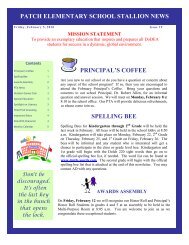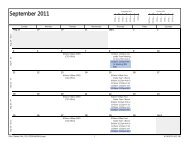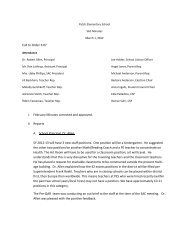German Immersion - Patch Elementary School
German Immersion - Patch Elementary School
German Immersion - Patch Elementary School
Create successful ePaper yourself
Turn your PDF publications into a flip-book with our unique Google optimized e-Paper software.
The Partial <strong>German</strong> Language <strong>Immersion</strong> program is available to a limited number of students in grades one, two, three and<br />
four. If you are interested in having your child considered for placement in this program, please contact the <strong>School</strong> Registrar.<br />
The <strong>German</strong> <strong>Immersion</strong> Program at <strong>Patch</strong><br />
<strong>Elementary</strong> <strong>School</strong> offers two strands:<br />
Multi-Age (grades 1-3) strand:<br />
Children typically enter in their firstgrade<br />
year and remain in the class<br />
with the same teacher for three years<br />
Graded strand:<br />
Offered in grades 1-4<br />
Children may enter at any grade level<br />
Children move to the next grade and a<br />
new teacher the following year<br />
Primary considerations for placement in<br />
the <strong>German</strong> <strong>Immersion</strong> program:<br />
DEROS of at least 2 years<br />
First language spoken at home is NOT<br />
<strong>German</strong><br />
No first-language acquisition delays<br />
What are the benefits of becoming<br />
bilingual<br />
“Ich kann gut Deutsch sprechen, aber<br />
meine Mutti und mein Vati koennen<br />
das nicht so gut.” -- Anna, year 2<br />
“Ich habe einen [deutschen] Freund<br />
Max und wir spielen immer<br />
zusammen.” -- Aidan, year 2<br />
“Rebecca und ich gehen zum<br />
Pferdestall und wir reiten und spielen<br />
zusammen. Rebecca ist meine<br />
[deutsche] Freundin.” -- Riley, year 3<br />
“Ich spreche nicht so gut Deutsch. Ich<br />
lerne Deutsch!” Eric, year 1<br />
“Ich kann meiner Mutti und meinem<br />
Vati helfen wenn wir in ein Restaurant<br />
essen gehen.” -- Hannah, year 3<br />
Phone: DSN 430-5200 CIV 0711-680-5200<br />
Partial <strong>German</strong><br />
Language<br />
<strong>Immersion</strong><br />
Program<br />
Alexander M. <strong>Patch</strong><br />
<strong>Elementary</strong> <strong>School</strong><br />
Unit 30401<br />
APO AE 09107
What is partial language immersion (PLI)<br />
Partial language immersion is a means of<br />
acquiring a foreign language through<br />
content matter instruction in the target<br />
language for at least half of the school<br />
day.<br />
What subjects are taught in the target<br />
language<br />
Subjects taught in <strong>German</strong> are math,<br />
science, social studies, health, and daily<br />
routines (Morning Circle, birthdays,<br />
calendar, clean-up, etc.).<br />
What subjects are taught in English<br />
Subjects taught in English are the<br />
Language Arts (reading, writing, spelling).<br />
What are the overall goals of partial<br />
immersion<br />
To develop students’ communicative<br />
ability (oral and written) in the <strong>German</strong><br />
language<br />
To develop multicultural awareness and a<br />
more global perspective<br />
To interact confidently with host nation<br />
peers in social and academic settings<br />
To succeed academically in all subject<br />
areas<br />
Why acquire a second language at an<br />
early age<br />
Research shows that PLI environments:<br />
Positively impact intellectual<br />
growth<br />
Exploit windows in children’s<br />
cognitive development that begin to<br />
close by age 10<br />
Reinforce and expand language<br />
development in the child’s FIRST<br />
language<br />
Create communicative abilities in a<br />
second language<br />
Develop flexibility in students’<br />
thinking<br />
Develop greater sensitivity to<br />
languages in general<br />
Improve listening skills<br />
Build strong cultural awareness and<br />
prepare students for participation in<br />
a global society<br />
PLI Standards<br />
Note: Stages do not necessarily correspond with<br />
the number of years in a language program.<br />
Beginning Stage<br />
Students will be able to:<br />
Follow oral directions<br />
Imitate sounds, words, and phrases.<br />
Communicate in simple words and<br />
sentences<br />
Experience host nation culture<br />
Copy and read symbols, words, and<br />
sentences<br />
List, identify, and label objects,<br />
concepts, and feelings<br />
Intermediate and Extending Stages<br />
Students will be able to:<br />
Interact orally and in writing in<br />
curricular content discussions<br />
Compose simple to complex<br />
sentences<br />
Decode a simple and more complex<br />
text with growing comprehension<br />
Respond in learned and original<br />
phrases to everyday and curricular<br />
situations<br />
Interact in cultural activities















